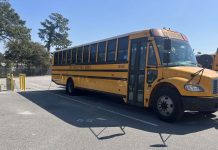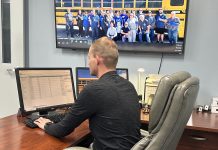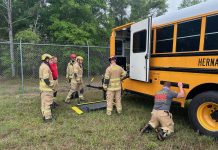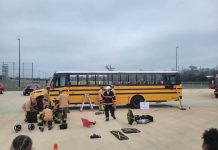FRISCO, TEXAS—Special needs attorney Julie Weatherly reviewed some common areas of confusion related to school bus services for students with disabilities and clarified issues relating to FAPE.
In her Monday sessions at the TSD Conference, Weatherly quoted from publications by the U.S. Department of Education’s Office of Civil Rights (OCR) that stated the Individualized Education Plan (IEP) is the centerpiece of the Individuals with Disabilities Education Act (IDEA), and the school bus vehicle as related service for providing a Free Appropriate Public Education (FAPE).
The most important things school staff dealing with special needs students can do, Weatherly reiterated throughout the day, are to pay attention to federal law and FAPE, ensure communication between the district’s special needs staff and transportation staff, make good faith efforts to provide equal service and document absolutely everything in writing.
The Americans with Disabilities Act mandates that disabled students receive equal access to services that nondisabled students have. However, Weatherly added that even if the district does not regularly provide transportation to any other student, they have to provide it if it is listed as a “related service” in the (IEP) of any preschooler or student who has special needs.
She stressed the importance of the transportation department to be involved in the IEP team meetings, so everyone understands what needs to be provided, and has input on how that is carried out. As TSD Tenured Faculty members Alexandra Robinson and Sue Shutrump said during Friday’s opening general session, Weatherly advised transportation to attend, even if they are not invited, since federal law might differ from state law and district policies, but always supersedes them.
“We need to really think outside the box sometimes—not just our own policies or the way we’ve always done it, but what’s best for this child,” she commented.
Related: ‘Then, Now and Tomorrow’ of Special Needs Student Transportation
Also, the procedure for developing the IEP content is as important as the content itself. Weatherly warned against predetermining a student’s special needs transportation. She encouraged making every good faith effort to involve the parents, considering parental input and data even if it’s not implemented, and looking at the individual child and their specific circumstances to form the IEP.
Two important U.S. Supreme Court cases in 1982 and 2017 decided that special needs students must have access to services that give them “some educational benefit” and enable them to “make progress in light of [their] circumstances.” Weatherly said annual IEP goals should be ambitious but realistic, and could include boarding or exiting the bus, moving to a regular bus, transitioning to less assistance on the bus, or continuing classroom goals. Progress must be monitored, measured and recorded.
Special needs students also may not arbitrarily be put on a special needs school bus, be let out of school early, have a longer bus ride than nondisabled students, or be removed from the bus for over 10 days, due to difficulties. They may need medicine on the bus, have a nurse paid for by the school, need transportation to after-school programs, or be allowed a service animal (which currently includes only dogs and mini-horses). All of these things are taken on a case-by-case basis, and depend on if they are in the IEP or are necessary to the student’s educational benefit.
















